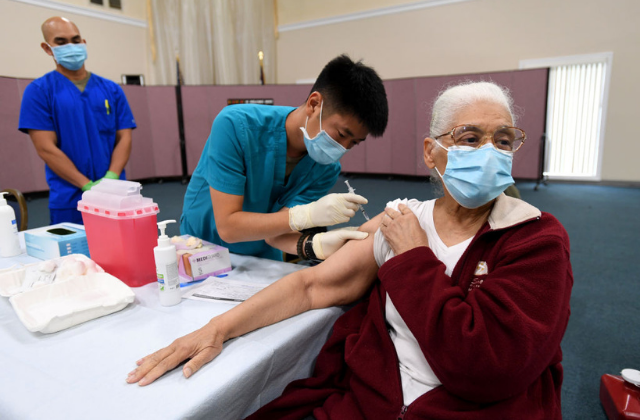The United States has more than enough COVID-19 vaccines readily available, and the World Health Organization (WHO) maintains that vaccines offer the strongest protections against deaths and hospitalizations. That still hasn’t stopped the persistent racial gap in who opts to get inoculated, which presents a grave danger to communities of color. Right now, federal figures show that predominantly Black counties have some of the lowest vaccination rates in the country, The Washington Post reports.
According to Vox:
At the start of July, the vaccination rate was about 15 percent lower for Black people than for white people in the US, and the rate for Hispanic people was about 3 percent lower.
…Recently, the gaps have begun to narrow, but disparities still remain, especially at the state level…Black people make up 12 percent of the US population but only account for 9 percent of people who have received at least one dose of the vaccine.
“I get mad when I see the numbers,” Ala Stanford, a surgeon and founder of the Black Doctors COVID-19 Consortium, told The Post. Her Philadelphia, PA-based organization had administered close to 50,000 vaccinations as of June 11, about 75 percent of which went to African American people. It’s like the city “just decided we are everybody Black in Philly’s answer,” she added. However, “It just can’t be me. What are the rest of y’all doing?”
Vox points to income level as being a major dividing line between who does and does not get inoculated. Low-wage earners are more likely to work in jobs that make it challenging to take time off, or to recover at home after receiving the shot. They are also likely to face barriers like securing transportation to clinics.
There are ultimately a wide variety of reasons why some people are holding out against the COVID vaccine. According to Vox:
The reasons people give for refusing vaccines vary: They don’t think Covid-19 is a big deal, they believe conspiracy theories about vaccines, they think the side effects and risks outweigh the benefits, they resent being told what to do. The varying reasons make it harder to come up with a broad-based appeal to get vaccinated.
For Black Americans, vaccine hesitancy is often rooted in a distrust of the government’s intentions. “The health-care system has been largely untrustworthy to African Americans,” Stanford told The Post. “Which is different than saying African Americans don’t trust the health-care system.”
On a more promising note, racial gaps in vaccinations are beginning to shrink, according to Ashley Kirzinger, associate director for public opinion and survey research at the Kaiser Family Foundation, who spoke to Vox.
“Early on during vaccine distribution, we had much larger shares of Black and Hispanic adults that were in this wait-and-see group,” she said. “They had legitimate questions and concerns about the vaccine and they didn’t want to be the first in line.”
Vox reasons that people of color can likely be persuaded to get inoculated with information about the safety and efficacy of COVID-19 vaccines.
“Because it happened so quickly, I was kind of like, ‘Whoa, whoa, whoa,’” Philadelphia emergency room doctor Chidinma Nwakanma told The Post. “Once I came to my own conclusion about why this vaccine is important and why I trust it, I felt a certain responsibility as a Black physician, as a Black person, to kind of spread that knowledge.”
